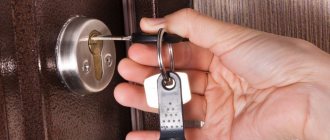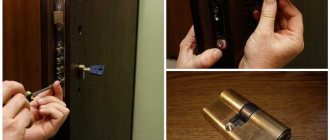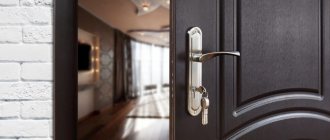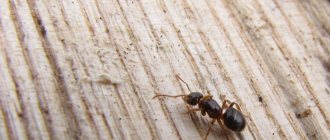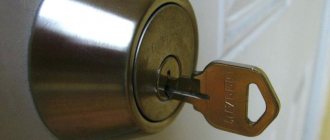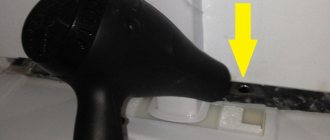The appearance of condensation on the iron door of a residential building is a problem that suddenly appears when frosty weather sets in. Not everyone knows why a metal entrance door “sweats”. Such “sweating” occurs mainly in individual housing, due to non-compliance with the half-forgotten requirements of building codes and regulations (SNiP) for the arrangement of housing and a number of related reasons, the main one of which is the presence of metal parts.
When installing a wooden door at the entrance, this problem will not arise at all. But an iron door has a number of undeniable advantages in the private sector, and the solution to the question of what to do with condensation on a metal entrance door can be found in several different ways, which we will consider in the article.
Causes of condensation
Metal doors are most often susceptible to fogging. The reason lies in their high thermal conductivity (compared to wood, it is 300 times higher for metal). Therefore, as soon as you install a metal street door in a private house, it will begin to become covered with condensation on the inside, cold air will be drawn from it, and water droplets will turn into frost or ice.
Why does this happen? One reason could be:
- temperature difference between surfaces and air. The metal, in this case, becomes a catalyst that changes the state of aggregation of water, so it freezes.
Interesting: it’s like pouring liquid on hot metal - it will simply evaporate. But in this situation, the opposite is true - when water hits the supercooled surface of the door, it turns into ice;
- the door is poorly insulated or not insulated at all;
- poor insulation of the box. Condensation on the frame and on the door leaf itself can occur due to poor insulation of the frame and slopes, as well as due to the presence of cracks in them;
- lack of tightness. If you feel that there is a draft “walking” near the door, this is a sign that the door leaf does not fit tightly to the door frame and the tightness between them is broken;
- the presence of cold bridges - through door elements (frame, stiffeners, lock), which are not insulated and easily conduct cold air inside the house. The cold passes through these bridges and the moisture is converted into water droplets;
- low air temperature in an unheated vestibule or corridor;
- high humidity. Condensation can appear even in a heated room. The problem is that the higher the humidity levels, the smaller the temperature difference required for the door surface to become wet.
Anti-fogging agents for outdoor metal doors: names, method of application
You can combat condensation on the surface of the front door using products for car enthusiasts. Products that prevent the formation of condensation on the windshield of a car are suitable.
Product overview:
- Anti-fog Very Lube. This is a can that contains 200 ml of solution. The product is applied once a month to a dry, clean door surface. Please note that the surface must be completely dry. Wash, dry it and only then apply the product.
- Novax . This is also a means that prevents the formation of condensation on the surface. Apply to the inside of the front door. After applying the product, the surface is wiped with microfiber for glass or smooth surfaces.
- Shell Antifog. An anti-fog agent that prevents the formation of condensation. It also removes fingerprints and cleans the surface. Therefore, it is necessary to apply the product for the first time to clean the door, and then shake the bottle again and apply a thin layer, evenly distributing it with microfiber.
- Atas Rocks . Good anti-fog, 200 ml bottle. Spray onto the surface at a distance of 20 cm from it and spread with a soft cloth. Apply once a week.
- Mathil Black line. Anti-fog agent, prevents condensation. In order to prevent the accumulation of water, it is necessary to apply the product both outside and inside the front door, spreading evenly with a clean sponge or napkin.
Remember, these products do not eliminate the cause of condensation, but only form a special film on the surface of the door that changes surface tension. Because of this, condensation still forms, but only rolls off the surface and forms a puddle of water under the door. This method will not save you from the appearance of fungus or damage to the integrity of the door. Before using such means, it is necessary to solve the problem of insufficient insulation and thermal insulation of the door.
Entrance doors
The formation of condensation on the surface of the entrance door is a common problem faced by residents of private houses. In order to combat this problem, you can equip a vestibule. If this is not possible, take care to insulate the doors and also insulate cold bridges.
Consequences of inaction
If owners do not pay attention to the formation of condensation, this will lead to:
- Serious freezing of the canvas.
- Increased heat loss. Such a door will transfer all the heat outside.
- Deformations of the door frame, slopes and leaf. As a result: while saving on eliminating the cause of condensation, you will have to spend money on a new entrance door. Is it worth it - you decide?
Why is condensation dangerous?
Visually, a door with dripping drops of moisture does not look very aesthetically pleasing. When the surface freezes strongly, condensation turns into frost and ice. Condensation makes the air drier, worsening the indoor climate.
Draining moisture enters the keyhole or the lower grooves for the vertical anti-removal pins. If it freezes, you may find that the door simply cannot be opened.
Due to the moistening of the surface, corrosion, rust stains, fungus, and rotting of adjacent wooden parts of the structure form. You regularly have to wipe away any moisture that flows down and remove mold. However, any cleaning only eliminates the consequences; for effective control it is necessary to eliminate the cause.
How to get rid of condensation on a door?
To get rid of freezing and the formation of water droplets on the door, take into account exactly where the cold bridge appears.
If cold air and a small draft enters through the lock, then install a special cover with a moving lid on it, which will close the well and keep the cold out. To use the lock, you just need to move the cover to the side. This option will not be able to completely eliminate condensation, but will reduce its occurrence to a minimum.
You can also stick a sealing self-adhesive rubber band around the entire perimeter of the canvas. The tape is applied to the junction of the leaf and the door frame, forming double protection. In this way, you will reliably seal possible cracks and prevent the formation of drafts.
If hard-to-reach cracks and gaps between the doorway and the leaf were poorly sealed during installation, then sealing tape will not help. You need to take serious measures and open the slopes or door frame, seal them with polyurethane foam, insulate them with mineral wool and sealant. Then bring the slope back to its original form, sealing it with plastic or finishing materials.
It is advisable to insulate the front door with foam plastic from the outside and cover it with decorative materials that are resistant to precipitation. Another simpler option is to paint the door with a special liquid insulation - this is a paint that creates a thin film that repels water and saves heat indoors (it is usually used to insulate pipes).
Ways to combat the phenomenon
If iron doors fog up, it is recommended to perform a number of manipulations to eliminate this problem:
- Seal the entrance door around the perimeter of the leaf. For this, it is best to use a rubber cord. It is attached to the porch. In some door designs, the seal is installed during production. This measure will avoid the formation of drafts.
- Thermal insulation of the door leaf. Various types of insulation are used, the most popular of which are polystyrene foam and mineral wool. It is important to choose a material of suitable thickness. The joints of the strips must be connected with construction tape.
- It is recommended to close the keyhole with a special cover. This will not interfere with the operation of the locking mechanism, but will also prevent cold air from penetrating through a leak in the lock.
- Door frame seal. It is necessary to fill the space between the door frame and the entrance opening. For this purpose, polyurethane foam is used. If the material has lost its properties, it must be removed from the gap between the box and the opening and another portion of foam must be added. However, in this case, it is necessary to putty the updated areas, which will avoid loss of properties of the material.
- Insulation of door slopes. To do this, it is necessary to dismantle the slopes, secure material with thermal insulation properties, and then install them again.
- It is necessary to control the humidity level in the house. If natural circulation is not effective enough, supply and exhaust ventilation should be installed.
Preventing condensation
The appearance of condensation on a metal entrance door in a private home can be prevented if, during the installation process, you ensure that the door installers properly seal all the cracks and gaps with polyurethane foam. Even a gap of just 1 mm can increase over time and lead to fogging and freezing of the entire structure.
Advice: agree, 1 g of prevention is better than 1 kg of treatment! Likewise, it is better to be meticulous during the installation process than to later spend a lot of time and money searching for and fixing a problem that occurs at the wrong time - in winter
What to do if all the methods you tried did not help you? This means that the problem lies in the material of the door itself. It is simply made of low-quality material that is not capable of retaining heat. In this case, it makes sense to think about installing a new door that would meet the thermal insulation requirements.
How to prevent the problem
There are three ways to help prevent condensation if the door is metal. Let's look at them in more detail:
- Carefully check the structure during installation to ensure that there are no voids left between the frame and the wall. Even a small gap will lead to problems in the future. It is better to install the door efficiently from the very beginning, rather than disassemble the structure over time to eliminate the cause of condensation;
- Do not install a peephole and it is better to additionally insulate the keyhole;
- Do not purchase a product with vertical crossbars that will conduct cold air to the box in frosty weather.
Important! For additional heating, place heating devices near the entrance doors. Heating will dry the air and evaporate excess moisture. But do this in moderation, avoiding heating the door leaf.
If you do not neglect these tips and figure out the reasons from the very beginning, you can later avoid problems that will require dismantling the structure to eliminate. So we follow the rule - it’s better to do everything efficiently from the very beginning, rather than to redo it when first there seems to be minor condensation, and then just a stream of water on the front door.
Voted over 149 times, average rating 4.6
Comments
Chervatyuk Maria Pavlovna 05.11.201808:06 Condensation of the front door around the entire perimeter, what to do?
Grade
Svetlana 02/13/202018:45 Oh my God! As with windows with double glazing or double glazed windows! Are the doors leaking? The second doors are from the inside!!!! Wooden! Recessed and upholstered, as usual, foam rubber and dermantine!
Grade
Vladimir 08/01/202110:08 Condensation on the front door in an apartment building in the summer. ? !
Grade
Add a comment Cancel reply
We recommend reading
Miscellaneous Simple instructions: how to adjust plastic entrance doors yourself Residents of city apartments everywhere install plastic windows and ...
Locks, Miscellaneous What kind of damage to the locks of a metal entrance door can be repaired independently? Entrance doors are used intensively, and every cycle...
Doorway, Locks, Miscellaneous How to measure the opening for installing the front door, comply with the standards and not make a mistake? When buying a new apartment, house or building a new cottage...
Miscellaneous What icon is hung above and opposite the front door? Christian icons are found in almost every home. One people …
Additional measures
As additional measures to protect against condensation, you can try the following tips:
- install a canopy or canopy over the front door. It will partially prevent direct contact of snow or rain on the outer door leaf;
- when buying a new door, pay attention to whether it is coated with a special treatment - polymers that are resistant to temperature changes and precipitation;
- make a vestibule, and install a second door made of wood or plastic, but not metal. Then condensation will not appear, since the temperature difference will not be so large. Heat and humid air from living rooms will not flow into the corridor;
- if there is no vestibule and there is no way to make one, then install small heating devices or heaters in the corridor. They will heat the door, slopes and frame, preventing the appearance of water drops.
Recommendations from experts
So that during operation you do not have questions to the manufacturers about why condensation forms in cold weather, experts recommend taking into account the following points when placing an order:
- Separately discuss and order insulation of not only the door itself, but also the frame.
- Refuse to install a peephole in the door facing the street.
- Do not install locks with vertical bolts on such a door or do not connect drive rods in cold weather.
